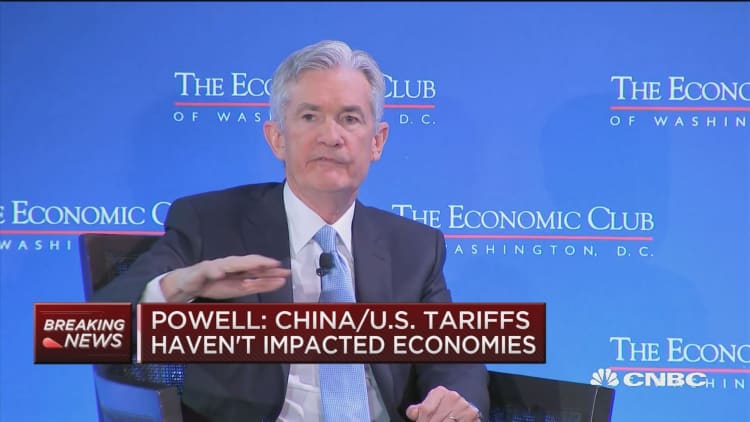Fed Chairman Powell says he is ‘very worried’ about growing amount of U.S. debt
|
KEY POINTS
- “I’m very worried about it,” Fed Chairman Powell said Thursday. “It’s a long-run issue that we definitely need to face, and ultimately, will have no choice but to face.”
- Total U.S. debt is about $21.9 trillion, of which $16 trillion is owed by the public. The sustained annual U.S. deficit is now believed to be more than $1 trillion.
- In part because of continued rate increases under Powell, the interest cost on that debt could start to become a bigger and bigger burden.
WATCH NOW
Federal Reserve Chairman Jerome Powell is concerned about the ballooning amount of
United States debt.
“I’m very worried about it,” Powell said at The Economic Club of Washington, D.C. “From the Fed’s standpoint, we’re really looking at a business cycle length: that’s our frame of reference. The long-run fiscal, nonsustainability of the U.S. federal government isn’t really something that plays into the medium term that is relevant for our policy decisions.”
However, “it’s a long-run issue that we definitely need to face, and ultimately, will have no choice but to face,” he added.
The Fed chief’s comments came as the annual U.S. deficit reaches new sustained highs above $1 trillion, a fact many economists worry could spell trouble for future generations. Annual deficits have topped $1 trillion before, but never during a time of sustained economic growth like now, raising concern about what would happen if a recession hits.
Total U.S. debt is about $21.9 trillion, of which $16 trillion is owed by the public. In part because of continued rate increases under Powell, the interest cost on that debt could start to become a bigger and bigger burden.
Wall Street’s “bond king” and respected financial prognosticator Jeffrey Gundlach said in December that the Fed seems to be on a “suicide mission,” raising rates while the government deficit increases as a share of GDP. Normally when the deficit is expanding, the Fed would be lowering interest rates.
Gundlach added that the economy appears to be slowing “and maybe the supply makes it so rates don’t go down with economic weakness.”
Fitch Ratings — one of the top credit rating agencies that analyzes companies and governments alike — said Wednesday that the ongoing government shutdown could soon start to impact its ability to pass a budget and could impact the government’s triple-A sovereign score.

How come nobody mentioned the debt when Heir Obama was in the White House cranking away on the debt.
ReplyDeleteHow bad is DC spending our money? DC is still giving foreign aid to China. No kidding.
ReplyDeleteWe are leaving the next generation of Americans with 23 Trillion dollars of debt spent on our generation.
We DO owe the next generation of Americans the paying down of our debt we are leaving them.
We DO NOT owe foreigners squat.